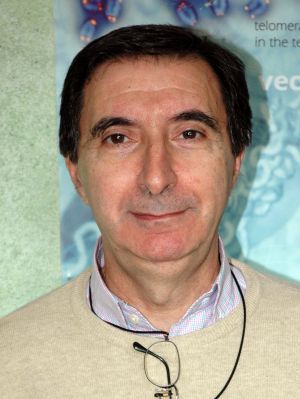Juan Ortín is a key name in Spanish science and is recognised worldwide as a leading expert in influenza virus, to which has devoted more than three decades of study. Now, at age 70, he will say farewell, leaving a scientific legacy of the highest order and many new researchers who had the good fortune to learn with him. In an event to celebrate his retirement, the Centro Nacional de Biotecnología of the CSIC (CNB-CSIC) transmitted the affection and recognition of a research institute that was born and grew up with him.
Originally a chemist, Ortín began his training as a researcher with the well known scientists Margarita Salas and Eladio Viñuela. In the 1980s, as an independent scientist with his own group, he joined the CNB-CSIC at its beginnings. He has since remained closely linked to the centre.
To bid him farewell, many colleagues who accompanied him throughout his professional life gathered at the CNB-CSIC, as well as students who learned with him, people with whom he began his career in science, and coworkers who have shared important moments in recent years.
His contributions to knowledge of the influenza virus include structural studies of the viral polymerase and the ribonucleoprotein (RNP) complex, which make up the viral transcription and replication machinery. His laboratory’s study of RNP led to the first detailed images of the viral genome expression machinery and its three-dimensional reconstruction.
Ortín has also garnered success in his career with his research on the mechanisms of interaction between the virus and the infected cell, and the adaptation of the viral genome to the host’s innate cellular response to infection.
These studies have made his group a leader in the field of flu research.
A life devoted to virus
Madrid-born, Ortín studied in the School of Chemistry at the Universidad Complutense in Madrid. After taking a Bachelor’s degree with honours, he leaned toward biology and joined Margarita Salas and Eladio Viñuela’s group at the Center for Biological Research (CIB), with whom he carried out his doctoral thesis work on the phage F29.
On completion of his thesis, he decided to switch to animal viruses and to go abroad to increase his experience. It was during his time as a postdoctoral fellow in Walter Doerfler’s laboratory at the University of Cologne Institute of Genetics (Germany) that he took his first steps in genetic engineering techniques with mammalian cells, using adenovirus as a model.
Once back in Spain, he focussed his research on gene expression in the African swine fever virus, which caused considerable damage in the Iberian peninsula at the time. He worked again with Viñuela and Salas in the newly formed Center for Molecular Biology (CBM), where he set up his own group with Esteban Domingo. It was at this time that he began to specialise in the influenza virus, the studies that brought him the prestige he enjoys today.
He moved to the new CNB-CSIC when it began to take shape in the 1980s, where he has since continued his work to better understand the expression machinery and the genome of this virus that every year affects millions of people throughout the world.






